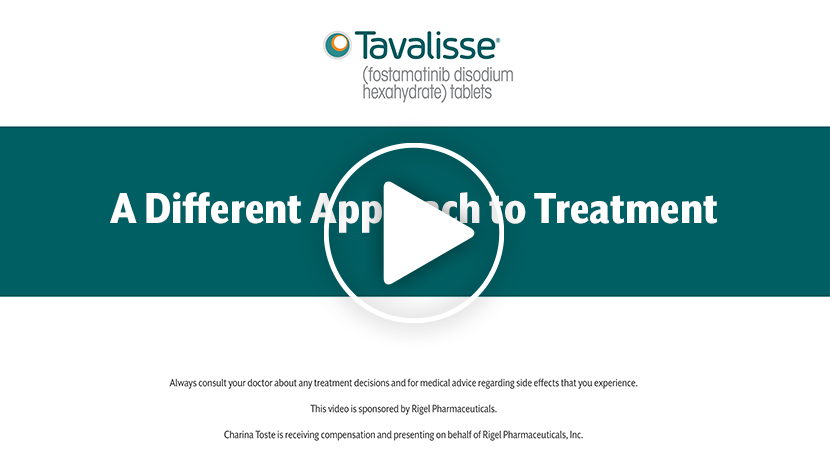Important Safety Information
What is TAVALISSE?
TAVALISSE is a prescription medication used to treat adults with low platelet counts due to chronic immune thrombocytopenia (ITP) when a prior treatment for ITP has not worked well enough. It is not known if TAVALISSE is safe and effective in children.
What is the most important information I should know about TAVALISSE?
TAVALISSE can cause serious side effects including:
- High blood pressure (hypertension). New or worsening high blood pressure is common in people treated with TAVALISSE and can be severe. Your healthcare provider will check your blood pressure regularly during treatment with TAVALISSE. If needed, your healthcare provider may start you on blood pressure medicine or change your current medicine to treat your blood pressure. Tell your healthcare provider if you get headaches, confusion, dizziness, chest pain, or shortness of breath.
- Liver problems. Changes in liver function blood tests are common with TAVALISSE. Liver problems may occur and can be severe. Your healthcare provider will regularly do blood tests to check how well your liver is working during treatment with TAVALISSE.
- Diarrhea. Diarrhea is common in people treated with TAVALISSE and can be severe. Tell your healthcare provider if you get diarrhea during treatment with TAVALISSE. Your healthcare provider may recommend changes in your diet, drinking more water, or medicine to limit these symptoms.
- Decreases in white blood cell count (neutropenia). Decreases in your white blood cell count are common with TAVALISSE and can be severe. This may increase your risk for infection, including serious infections. Your healthcare provider will regularly do blood tests to check your white blood cell counts.
Your healthcare provider may change your dose, temporarily stop, or permanently stop treatment with TAVALISSE if you have side effects.
What do I need to discuss with my healthcare provider before taking TAVALISSE?
Before you take TAVALISSE, tell your healthcare provider about all of your medical conditions, including if you:
- have high blood pressure
- have liver problems
- are pregnant or plan to become pregnant. TAVALISSE can harm your unborn baby.
- Your healthcare provider will check if you are pregnant before starting treatment with TAVALISSE.
- Females who can become pregnant should use effective birth control during treatment with TAVALISSE and for at least 1 month after the last dose.
Tell your healthcare provider about all the medicines you take, including prescription and over-the-counter medicines, vitamins, and herbal supplements. Taking TAVALISSE with certain other medicines may affect how the other medicines work or how TAVALISSE works.
What are the possible side effects of TAVALISSE?
The most common side effects of TAVALISSE include:
- Nausea, rash, dizziness, tiredness, respiratory infection, chest pain, and stomach (abdomen) pain.
These are not all the side effects of TAVALISSE. For more information, ask your healthcare provider or pharmacist. Call your doctor for medical advice about side effects. You may report side effects to FDA, at 1-800-FDA-1088.








